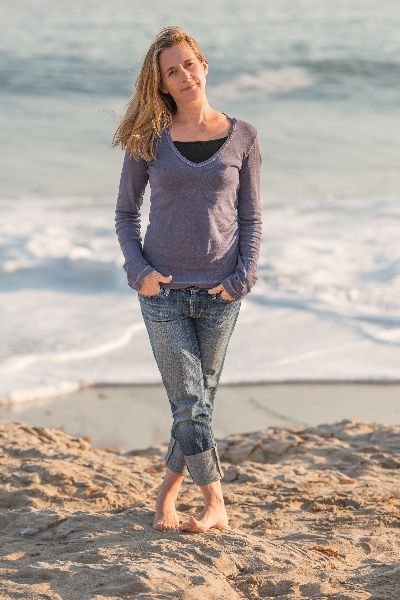Campus News
Exploring the dark waters of grief
Alumna Shannon Fowler, whose life changed in an instant with the tragic death of her fiancé, finds acceptance of death and grief—and has rediscovered her love of the ocean.

For the first 28 years of her life, and as a Ph.D. student in ecology and evolutionary biology at UC Santa Cruz, Shannon Leone Fowler saw the ocean as a place of beauty and wonder.
That changed on the afternoon of Aug. 9, 2002.
That day, she and her then-fiancé, a 25-year-old Australian named Sean, were wrapped in a romantic embrace in the water off Ko Pha Ngan island in Thailand when she felt something brush against her thigh and then Sean drop her from his arms.
Minutes later, Sean was dead on the beach, the victim of one of the world’s most venomous creatures—a box jellyfish—and Fowler’s life was upside down.
What happened over the next months, including a miscarriage and a lonely trek through the war-torn countries of Eastern Europe as Fowler attempted to come to terms with loss and guilt, is the subject of a new memoir titled Traveling with Ghosts, which Booklist compared to Cheryl Strayed’s best-selling memoir, Wild.
Tuesday, Feb. 21, at 7 p.m. Fowler will make an appearance at Bookshop Santa Cruz, to read from and discuss her book, including her eventual return to the ocean she loved.
Fowler, 42, lives in London now, the single mother of three children age 2 to 6. But in 2002 she was a world traveler who was living on Kangaroo Island off the coast of Australia, where, under the direction of Dan Costa, UC Santa Cruz professor of ecology and evolutionary biology, she was doing research on the diving habits of Australian sea lion pups.
She and Sean had just gotten engaged and decided to celebrate with a trip to Thailand when he crossed paths with the jellyfish, a fast-swimming invertebrate with deadly tentacles that reach almost 10 feet in length and whose populations and territories are increasing around the world.
Fowler, who a few days after Sean’s death would miscarry their child, was wracked with grief and got on a plane for Eastern Europe, a place that was about as far away from home and the sunny beaches of Thailand as she could get.
“I was 28 when Sean died, and everyone was getting married and getting pregnant and buying houses, and everyone was in this amazing place in life and I had a dead fiancé and a miscarriage,” Fowler recounted during a phone interview from her home in southwest London. “I found it hard to be surrounded by that.”
She also found there was little room for grief in American or Australian culture. Acquaintances wouldn’t look her in the eye. Neighbors would cross the street to avoid talking to her. Worst of all were the people who spouted platitudes about it being Sean’s time or that good would come from tragedy.
Wandering alone through war-ravaged countries like Bosnia, Poland, and Israel, Fowler would not only discover the kindness of strangers but also an acceptance of death and of grief, a way to live with horrific events instead of turning away from them. She kept detailed journals from that time.
At the encouragement of friends and family—her mom is the writer Karen Joy Fowler—and after getting her Ph.D. in 2005 and working in Antarctica for scientific and adventure operations for several seasons, Fowler began writing.
The result is part travelogue and part love story, but it is also an examination of the intensity of loss and the way we grieve.
“I’ll see a movie or a TV show or read a book where someone loses someone they love and two scenes later they are dating and are strong and have learned life lessons,” Fowler said. “Popular culture fast-forwards through what I wanted to focus on in my book … and that is the intense, day-after-day grief where you’re just trying to put one foot in front of the other. Not learning life lessons.”
Now raising her children and working as a writer, Fowler has rediscovered her love of the ocean, although, she said, it is tinted with a darkness that wasn’t there before. She also said that, even though it has been 14 years since his death, she still thinks about Sean.
“I still miss him every day,” she said. “I still wonder what we would have had together and, even if our relationship hadn’t survived, what he would be doing.
“I think,” she said, “I will always love him.”